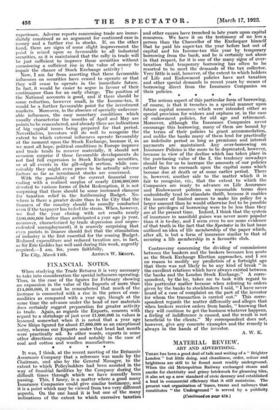FINANCIAL NOTES.
When studying the Trade Returns it is very necessary to take into consideration the special influences operating. Thus, in the case of the figures for February showing an expansion in the value of the Imports of more than £14,000,000, it must be remembered that much of the increase is connected with a rise in the prices of com- modities as compared with a year ago, though at the same time the advance under the head of raw materials does certainly suggest preparation for greater activity in trade. Again, as regards the Exports, concern with regard to a shrinkage of just over £1,000,000 in values is lessened somewhat when it is noted that a year ago New Ships figured for about £7,000,000 as an exceptional entry, whereas our Exports under that head last month were practically nil. In other words, exports in some other directions expanded and notably in the case of coal and cotton and woollen manufactures.
* * It was, I think, at the recent meeting of the Britannic Assurance Company that a reference was made IT the Chairman, and also by the General Manager, to the extent to which Policyholders had been assisted in the way of financial facilities by the Company during the difficult times through which we have recently been passing. This, I fancy, is a matter where a good many Insurance Companies could give similar testimony, and it is a point which may be viewed from two very different aspects. On the one hand it is but one of the many indications of the extent to which excessive taxation and other causes have trenched in late years upon capital resources. We have it on the testimony of no less a person than the Chancellor of the Exchequer himself that he paid his super-tax the year before last out of capital and his Income-tax this year by temporary borrowing from the bank, and he is certainly not alone in that respect, for it is one of the many signs of over- taxation that temporary borrowing has often to be resorted to to meet the demands of the tax collector. Very little is said, however, of the extent to which holders of Life and Endowment policies have met taxation and other special demands in recent years by means of borrowing direct from the Insurance Companies on their policies. * * * * The serious aspect of this particular form of borrowing, of course, is that it trenches in a special manner upon future capital resources which were intended either as special provision for widows and orphans or, in the case of endowment policies, for old age and retirement. Moreover, although the Insurance Companies never encourage this borrowing, many of them are bound by the terms of their policies to grant accommodation, and unlike the banks many of them lend for practically an indefinite period so long as premiums and interest payments are maintained. Any over-borrowing on Insurance Policies is the more to be deprecated, however, because in view of the decline which has taken place in the purchasing value of the £, the tendency nowadays should be for us to increase the amounts of our policies rather than to encroach upon the capital sums which become due at death or at some earlier period. There is, however, another side to the matter which it is fair to recognize, viz., that the extent to which the Companies are ready to advance on Life Assurance and Endowment policies on reasonable terms does undoubtedly tend to stimulate thrift, because it enables the insurer of limited means to make his policy for a larger amount than he would otherwise feel to be possible if the privileges of borrowing were to be less than they are at the present time. Indeed, I think that the system of insurance in manifold guises was never more popular than it is to-day, and I seem even to see some evidence of that truth in the fact that the Spectator in its last issue outlined an idea of life membership of the paper which, after all, is but a form of insurance similar to that of securing a life membership in a favourite club.
Controversy concerning the dividing of commissions between the bankers and the brokers becomes less acute as the Stock Exchange Election approaches, and I see no reason to modify my prediction of a fortnight ago that there was not likely to be any kind of break " in the excellent relations which have always existed between the banks and the London Stock Exchange." A corre- spondent, by the by, takes me to task with regard to this particular matter because when referring to orders given by the banks to stockbrokers I said, " I have never heard of a case of complaint on the part of the investor for whom the transaction is carried out." This corre- spondent regards the matter differently and alleges that when brokers receive orders from banks, " knowing that they will continue to get the business whatever happens, a feeling of indifference is caused, and the result is not beneficial to the clients." My correspondent does not, however, give any concrete examples and the remedy is always in the hands of the investor.
A. W. K.










































 Previous page
Previous page